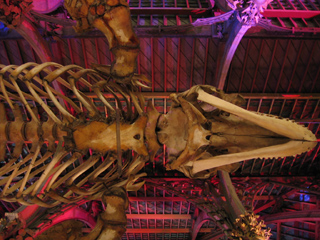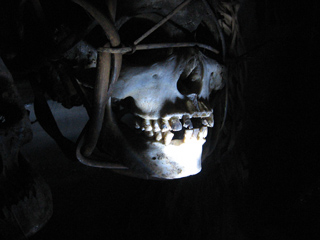Fans of Douglas Adams may appreciate being reminded that this coming Thursday, the 25th of May, is Towel Day. Created after his untimely death in 2001, the event is meant to mark his memory with good humour of the kind always demonstrated in his writing. Learning about his death was personally difficult in a way I don’t think it could have been for almost any other stranger.
For the unfamiliar, Douglas Adams is was best known as a British writer of science fiction, though much of his career was devoted to radio work. His most famous books are the Hitchhiker’s Guide to the Galaxy “trilogy in five parts” and the Dirk Gently’s Holistic Detective Agency duo (trio if you include the unfinished segment in The Salmon of Doubt). If you haven’t read them, you are a lucky person: you have the chance to spend the next few days experiencing something exceptionally amusing for the first time. Personally, I’ve read them at least six times each – including going through most of Dirk Gently’s aloud.
On the matter of why towels are relevant, I shall quote a section from the first Hitchhiker’s book:
A towel, [the Guide] says, is about the most massively useful thing an interstellar hitch hiker can have. Partly it has great practical value – you can wrap it around you for warmth as you bound across the cold moons of Jaglan Beta; you can lie on it on the brilliant marble-sanded beaches of Santraginus V, inhaling the heady sea vapours; you can sleep under it beneath the stars which shine so redly on the desert world of Kakrafoon; use it to sail a mini raft down the slow heavy river Moth; wet it for use in hand-to-hand-combat; wrap it round your head to ward off noxious fumes or to avoid the gaze of the Ravenous Bugblatter Beast of Traal (a mindboggingly stupid animal, it assumes that if you can’t see it, it can’t see you – daft as a bush, but very ravenous); you can wave your towel in emergencies as a distress signal, and of course dry yourself off with it if it still seems to be clean enough.
More importantly, a towel has immense psychological value. For some reason, if a strag (strag: non-hitch hiker) discovers that a hitch hiker has his towel with him, he will automatically assume that he is also in possession of a toothbrush, face flannel, soap, tin of biscuits, flask, compass, map, ball of string, gnat spray, wet weather gear, space suit etc., etc. Furthermore, the strag will then happily lend the hitch hiker any of these or a dozen other items that the hitch hiker might accidentally have “lost”. What the strag will think is that any man who can hitch the length and breadth of the galaxy, rough it, slum it, struggle against terrible odds, win through, and still knows where his towel is is clearly a man to be reckoned with.
Carrying a towel on Thursday is therefore both a way of marking your appreciation for Adams’ work and setting yourself out as the very example of a well-prepared and capable individual. Given that the world’s most interesting English-speaking people are all either present or future appreciators of Adams, you stand a decent chance of meeting some new ones if you carry the towel obviously enough.
To the many people who have already read and loved the books listed above, I recomment having a look at the lesser known non-fiction book Last Chance to See: written about a slightly mad worldwide expedition in search of endangered species, including the Kakapo parrot of New Zealand, Komodo Dragons, and Chinese river dolphins. The book has all of Adams’ characteristic wit, as well as quite a forceful conservation message. The fact that he climbed Mount Kilimanjaro while wearing a rhino costume definitely contributed to my own ambition to find my way to that lofty summit. Widely available in the UK, you may need to order the from here or wander through a few libraries to find a copy in the US or Canada.
Also worth noting is that Douglas Adams had one of the most amazing funerals possible: with the eulogy delivered by Richard Dawkins and a live performance of Wish you Were Here by David Gilmour of Pink Floyd. That’s my favourite song of theirs, as well. Dawkins also wrote a touching article in The Guardian praising Adams.



